Saif, McMaster PA-S1
What If Med School Isn’t the Only Way to Help People?
Saif thought he had it all figured out: get into med school, become a doctor, help people. Simple, right?
But when the MCAT didn’t go as planned, third-year burnout hit, and PA school came onto his radar, everything started to shift. In this episode, Saif shares how deep self-reflection, not just grades or rankings, ultimately led him to the Physician Assistant profession. And if you're stuck on the "MD or nothing" mindset, his story is exactly the reset you might need.
A drama student, military reservist, dancer, and kinesiology graduate, Saif's path wasn’t linear. But it was intentional. Through trial, error, and a lot of honesty, he discovered that success doesn’t always come with the title of "doctor."
He’s now a first-year PA student at McMaster, thriving in a program where problem-based learning is the norm, classmates feel like family, and clinical placements have given him the kind of real-world experience he was searching for.
If you're exploring the PA route or wondering whether you're choosing a career for the name or for the actual work, this episode is a chance to pause, reflect, and rethink what success means for you.
“Self-reflection was the turning point. Once I stopped chasing a label and started chasing alignment, I realized PA was exactly where I was supposed to be.”
SAIF, PAS1, MCMASTER PAEP
4 Key Takeaways from Saif
1. If your reason for medicine is to help people, there are other ways to do it. Saif’s turning point came when he asked himself: do I need to be called “doctor” to feel fulfilled? Once he started evaluating healthcare roles based on values instead of prestige, the PA profession started to make a lot more sense.
2. Your GPA isn’t your worth. But it can teach you a lot about how you learn. Saif’s GPA story isn’t flat. He went from distracted in first year, to hyper-focused in second, to overwhelmed in third, before finally finding balance in fourth. More than just a number, his GPA told the story of how he figured out what he needed to thrive.
3. Practice out loud. Record yourself. Watch it back. Repeat. Whether you’re prepping for the PA supplementary application or the MMI, Saif’s advice is simple and effective. Don’t just memorize content. Practice showing up as your real self in front of a camera or another human.
4. Self-reflection is more important than any checklist. You can check all the boxes—GPA, clinical hours, good references—but if you don’t know why you’re doing this, it’s easy to lose steam. Saif credits journaling and hard conversations with helping him find clarity.
Watch the Video
Resources
Follow Saif on Instagram @saifenous

